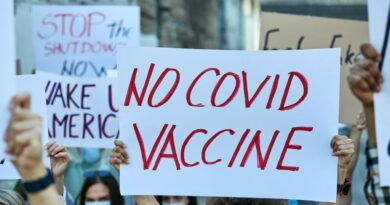Coronavirus cases rise in states with high vaccination rates, proving yet again the vaccines don’t work

The number of Wuhan coronavirus (COVID-19) cases continue to rise in over a dozen states despite high vaccination rates. On average, around 55,000 new cases are reported each day in the United States. This remains unchanged despite the fact that vaccinations continue to ramp up.
Public health experts are now urging Americans to be more cautious after more than a dozen states saw a rise in COVID-19 cases. In Maryland, the total number of new cases increased by 10.1 percent, while in Michigan, the numbers rose by 53.3 percent — the biggest jump in new cases the country has seen recently. Joining these two on the list are other states like Connecticut, Delaware, Hawaii, Idaho, Maine, Mississippi, Montana, Nevada, New Hampshire, North Dakota and West Virginia.
Despite Michigan having one of the highest vaccination rates in the United States, new COVID-19 cases continue to surge. Since December, Michigan has administered more than 3.1 million doses of coronavirus vaccine. Sarah Lyon-Callo, director of the Bureau of Epidemiology and Population Health at the state’s health department, claims that at least 25 percent of all residents above the age of 16 have already been vaccinated.
“Michigan definitely stands out in terms of having an increase in our hospitalizations and case rates,” said Lyon-Callo. “Our hospitals are experiencing increased pressure from COVID-19.”
Lyon-Callo and other public health officials in Michigan are blaming the rise in coronavirus cases on the relaxation of lockdown restrictions.
“We have reopened and the variant is here, so we need to push harder on masking and social distancing… We want to make sure that people are doubling down on that, we want to make sure that people are moving activities outdoors whenever possible, and we want to promote the use of antigen testing… While we’re getting more and more vaccines on board, which will reduce the spread of COVID-19 cases, it’s important that we push the seesaw toward those things that are … reducing the spread of COVID-19.”
Other states with high vaccination rates, such as West Virginia, Montana and Maine, are also dealing with a significant increase in cases. (Related: New coronavirus cases in Florida down 75 percent since January despite high prevalence of “more contagious” UK variant.)
More than 118 million vaccine doses have been given in the United States
According to the latest reports, more than 420 million doses of coronavirus vaccines have been administered in 133 countries worldwide. This means that nearly 10 million doses were being given each day.
In the U.S., the number of Americans who have received at least one dose of a coronavirus vaccine is greater than the number of people who have tested positive for the virus. Over 118 million doses have already been given in the country, which translates to around 35.6 doses for every 100 people. Last week alone, an average of 2.455 million doses was administered per day.
The latest data shows that around 23.3 percent of the population have received at least one dose of the vaccine, and 12.6 percent are considered to be fully vaccinated. Big pharma corporations have promised to deliver enough shots to fully vaccinate 130 million Americans by the end of March and 300 million people by the end of May. According to public health officials, the government is aiming to fully vaccinate up to 85 percent of the country’s population before it considers the pandemic dealt with and allows society to return to normalcy.
At the current pace of vaccinations, it will take another five months before 75 percent of the population is successfully immunized. But the speed at which the country’s population is being vaccinated is expected to increase over time.
The vaccines made by Pfizer-BioNTech and Moderna require two doses to be taken several weeks apart, while the vaccine made by Johnson & Johnson, who had just received emergency use authorization from the Centers for Disease Control and Prevention, requires only a single dose.
For more news on the United States’ mass vaccination campaign and the effectiveness of COVID-19 vaccines, visit Pandemic.news.
Sources include:


